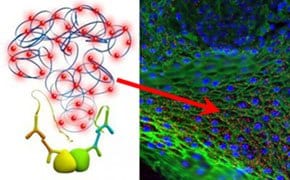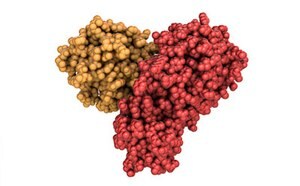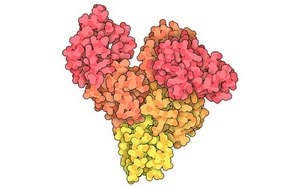Interrogation of Protein Pathways

Biochemical and environmental signals in the body control intracellular processes as well as interactions between cells, tissues, and organs. These signals are relayed by a complex network or pathway of proteins, enzymes, and receptors. Protein pathway analysis is key to understanding cellular and biological processes, protein interactions, and their impacts on signaling pathways, physiology, dysfunction, and disease. Small-molecule compounds, including inhibitors, activators, and other pathway modulators, are critical tools for researchers studying cell signaling and other mechanisms that control cell fate, function, and phenotype.
Featured Categories
Duolink® Proximity Ligation Assay (PLA) technology for detecting and quantifying...
Our portfolio of high-quality coenzymes reliably facilitate the function of enzymes and catalyze reactions for your research applications.
Protease reagents and resources for endo- and exopeptidase cleavage application needs and resources for your protein cleavage workflow.
Albumin is used in vitro to bind, sequester and stabilize a range of important small molecules and...
Chemical Screening and Treatment
Chemical screening is essential to drug discovery and involves identifying chemical probes. It uses techniques ranging from high-throughput screening to assaying enzyme and protein targets for potential therapeutics. An emerging trend in screening is the increased use of phenotypic assays to identify compounds that produce desired changes in biomarker expression, protein activity, and cell behavior. Chemical library screening helps researchers identify hits that can be starting points for drug discovery. From there, they can refine the hits from target-based or phenotypic screens to generate lead compounds for further investigation and development into drugs.
Explore Chemical Treatment and Screening
Protein and Enzyme Activity
Proteins are biomolecules and macromolecules that are made of amino acids. They perform varied functions in cells and organisms including:
- Catalyzing reactions
- Assisting in DNA replication
- Transporting molecules
- Providing structure to cells
- Acting as receptors for cell signaling
- Providing channels for charged molecules to pass through membranes
Investigating protein and enzyme activity is fundamental to understanding how cells and organisms function, as dysregulation of protein activity is linked to many diseases. Their activity can be probed using small molecules to disrupt or modulate function and observing changes in protein or enzyme concentration, or even through using enzyme activity assays to determine how compounds affect enzyme activity.
Explore Protein and Enzyme Activity
Protein Pathway Modulation
Protein pathway interactions play important roles in biological processes such as cell growth, differentiation, signal transduction, and apoptosis. Small molecules are important tools for probing mechanisms underlying biological processes and how they relate to disease. They also allow for the modulation of proteins involved in a pathway to identify what roles they play and how they interact with other proteins in the pathway. These pathways can be modulated by inhibition or disrupting interactions, and also by activating proteins and receptors to produce a biological response with activators or agonists.
Visit our document search for data sheets, certificates and technical documentation.
Related Articles
- Explore compound library screening options with our Pharmacologically Active Compounds portfolio.
- Learn the role of enzyme inhibitors including why enzyme inhibitors are important, the advantages of small molecule inhibitors vs RNAi, and how enzymes work with lock-and-key and induced fit models.
- Discover definitions and uses for irreversible inhibitors including the types of irreversible inhibitors: suicide inhibitors, heavy metal inhibitors, and time-dependent inhibitors.
- Explore the different types of reversible inhibitors and their kinetics including competitive inhibitors, uncompetitive inhibitors, non-competitive inhibitors, mixed type inhibitors, allosteric inhibitors, and end product inhibitors.
- Learn definitions for useful enzyme inhibitor terms and understand common enzyme inhibitor calculations for your next experiment. Also, see how to calculate catalytic efficiency to compare enzymes.
- See All (102)
Related Protocols
- The appearance of uric acid is measured at 293nm by spectrophotometry.
- To measure 5′-nucleotidase activity, this procedure uses adenosine 5’-monophosphate and a color reagent to create a standard curve for determining the micromoles of phosphorus liberated.
- This procedure may be used for the determination of Amyloglucosidase activity using starch as the substrate.
- Measure luciferase activity using a luminometer assay detecting light emission, with applications in ATP detection and genetic function reporting.
- This technical article described the Enzymatic Assay of Trypsin Inhibitor.
- See All (16)
Find More Articles and Protocols
How Can We Help
In case of any questions, please submit a customer support request
or talk to our customer service team:
Email custserv@sial.com
or call +1 (800) 244-1173
Additional Support
- Chromatogram Search
Use the Chromatogram Search to identify unknown compounds in your sample.
- Calculators & Apps
Web Toolbox - science research tools and resources for analytical chemistry, life science, chemical synthesis and materials science.
- Customer Support Request
Customer support including help with orders, products, accounts, and website technical issues.
- FAQ
Explore our Frequently Asked Questions for answers to commonly asked questions about our products and services.
To continue reading please sign in or create an account.
Don't Have An Account?



